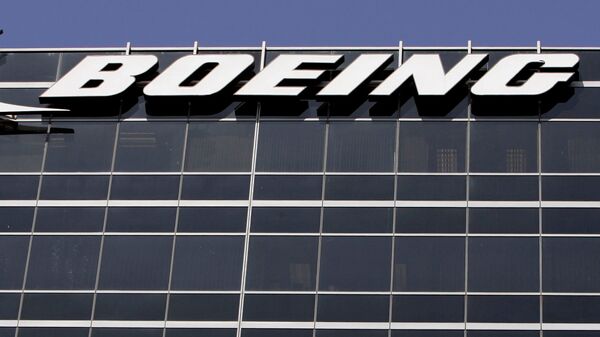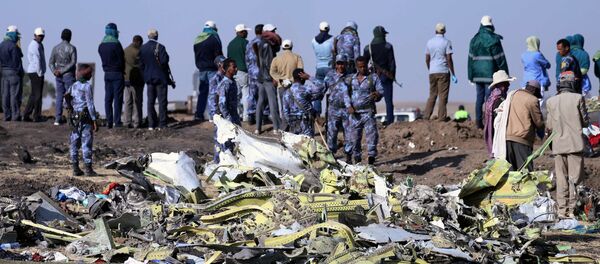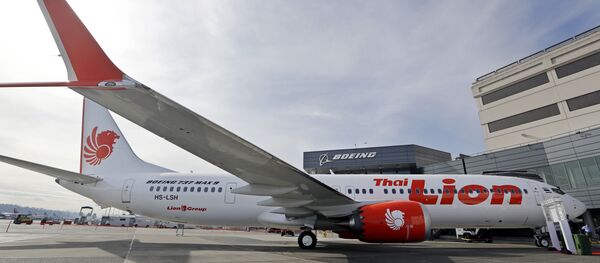"The Federal Aviation Administration defers to Boeing just as it does to other manufacturers and airlines for a lot of its consideration. It's very deferential, especially to Boeing. Boeing has tremendous capabilities, knowledge and insight. Over time, the FAA has relinquished more and more of its oversight to designated examiners, designated inspectors, etc., so the FAA defers to Boeing's opinion," Schiavo told Sputnik's Loud & Clear hosts John Kiriakou and Brian Becker.
"And that's the way it's been for years. I'm not suggesting there's any nefarious going on in this particular incident. This is how the FAA typically works. This, for them, is business as usual," Schiavo added.
On Sunday, a Boeing 737 MAX 8 plane operated by Ethiopian Airlines, bound for the Kenyan capital of Nairobi, crashed soon after taking off from Addis Ababa, Ethiopia, at around 8:30 a.m., killing all 157 people on board. According to Ethiopian Airlines, contact with the plane was lost at 8:44 a.m., just a few minutes after it took off.
The latest crash is the second one involving a Boeing 737 MAX 8, a new model of commercial passenger aircraft, in the last few months.
In October 2018, a Lion Air plane crashed into the sea just minutes after taking off from the Indonesian capital of Jakarta. All 189 passengers onboard were killed. The black box retrieved after the crash revealed that the plane's sensors had been displaying incorrect speed and altitude readings.
On Monday, the FAA issued a statement saying that the organization is "collecting data and keeping in contact with international civil aviation authorities as information becomes available."
"The FAA will issue a Continued Airworthiness Notification to the International Community for Boeing 737 MAX operators," the statement read, also adding that Boeing would have to make changes to its 737 MAX 8 aircraft's flight correction system no later than April 2019.
"[Following the Ethiopia airlines crash] the FAA quickly said, ‘Well, we didn't know what happened, so we're not going to say. Here's a new notification, the notification says that this is a notification of continued airworthiness. But, by the way, you [Boeing] have to make the following changes. We're [the FAA] getting tough, we're saying they [Boeing] have to have this done by April, and it includes changing the flight control systems of the plane, very clearly, including limiting the system that pushes the nose down against the demands of the pilot.' But then the FAA says, of course, ‘But by the way, the plane's still airworthy,'" Schiavo told Sputnik.
"For that statement, they're using very clever wording. Two planes have fallen out of the sky, but until someone brings them [the FAA] evidence, they're going to maintain that it's [737 MAX 8] airworthy," Schiavo added.
"What they're [the FAA] doing is betting the lives of passengers that a third one [crash] won't happen. They've already admitted the plane has to be changed by April, but they're just saying we're betting another one isn't going to happen. They're betting with passengers' lives," Schiavo continued.
Following the Ethiopian Airlines crash, EU states, including China, India, Egypt, Vietnam and many other countries around the world, prohibited the Boeing 737 MAX 8 from entering their airspace. On Wednesday morning, days after the crash and after many criticized the FAA for their initial refusal to ground the jets in question, US President Donald Trump also stated that he would ground the 737 planes until Boeing arrives at a solution to the safety issues.
— The FAA (@FAANews) March 13, 2019
In addition, Trump criticized "modern planes" on Tuesday, claiming that "complexity creates danger" and that we "need computer scientists from MIT" rather than pilots.
— Donald J. Trump (@realDonaldTrump) March 12, 2019
— Donald J. Trump (@realDonaldTrump) March 12, 2019
"There are two things glaringly mistaken about what our president said," Schiavo told Sputnik.
"Statistically, every new model of plane, except this one [Boeing 737 MAX 8], has improved safety statistics over time. Modern advancements have done great things to safety statistics… they have actually saved thousands and thousands of lives."
"And second of all, college physics reminds us of ‘once in motion, stay in motion.' The problem with this plane is that it puts the plane on a trajectory that cannot be overcome by human beings. The sheer force of the human body in the cockpit pulling on this aircraft cannot overcome a full, nose trimmed down stop. So, what we have to do is make the planes amenable to the pilots when something goes wrong. The pilots get blamed three-fourths of the time, but we have these systems now where the pilot can be overridden," Schiavo noted.
Airline pilots on at least two US flights have said that engaging the autopilot on the Boeing 737 MAX 8 planes causes the aircraft's nose to tilt down steeply, according to multiple reports.
After the Lion Air crash, the FAA informed airlines that incorrect inputs from the plane's anti-stall system's sensors could force the plane to adjust its nose downwards, even when autopilot is turned off. According to Indonesia's National Transportation Safety Committee, the anti-stall system was not properly detailed in Lion Air's flight manual.





